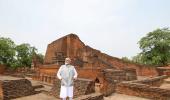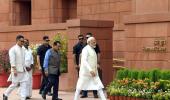Occasional lovers' tiffs have marked the history of RSS-BJP relations.
To think that Nagpur will bring about any change in leadership is a misreading of both its intent and its power, points out Shekhar Gupta.

What was the Rashtriya Swayamsevak Sangh thinking when it decided to unleash a flurry of statements, widely seen as expressing disapproval of the Bharatiya Janata Party government for its ahankaar (arrogance)?
The four specific instances include Sarsanghchalak Mohan Bhagwat's speech at the conclusion of the RSS workers' training, and a specific reference to ahankaar by Indresh Kumar, a member of the Sangh's executive committee and chief patron of the RSS-backed Muslim Rashtriya Manch.
Mr Kumar said that Bhagwan Ram had punished the BJP's arrogance by limiting it to 240 seats, way below the halfway mark.
He also said the justice of Ramrajya ensured that the INDIA bloc was kept even lower at 237 because it is 'Ram virodhi' or anti-Ram.
Ratan Sharda, an RSS intellectual often articulating the organisation's viewpoint and ideology on television channels and in newspaper op-eds, had more specific criticism over the BJP undermining its own ideological commitment by inducting many known critics of the RSS, and thereby paying the price.
The fourth is an article in the RSS mouthpiece, Organiser, blaming the alliance with the Ajit Pawar-led Nationalist Congress Party for the debacle in Maharashtra.
Read together, these four instances look like the first coordinated criticism of the BJP under Narendra Modi by the RSS in the past decade.
In fact, Mr Bhagwat in his speech counselling restraint said he'd prefer pratipaksh (the other side) to virodhi (Opposition).
Which brings us to our next question: What is the RSS trying to achieve?
Caught in this flutter are all sides with stakes in power politics or a voice in the political debate.
First of all, it is most certainly amused by the ready celebration of its latest 'intervention' by the liberal side.
For a community that fought the RSS ideology for decades to now find solace in its chief's non-specific criticism is ironic as well as desperate.
Even some in the Congress have expressed the same wish, partly to tease the BJP, but partly also in the belief that it will weaken Narendra Modi.
There's been a flurry of articles and social media posts with Mr Bhagwat's quotes, generally saying, 'We understand that you (Prime Minister Modi) won't listen to us. But at least listen to Mohan Bhagwat.'
In this brave new post-June 4 universe, the RSS chief is seen as less illiberal -- and more acceptable -- than the Modi-Shah BJP.
This is an incredible misreading of the situation. The fact is that occasional lovers' tiffs have marked the history of RSS-BJP relations.
These rarely change anything substantively.
To think that Nagpur will bring about any change in leadership is a misreading of both its intent and its power.
This election has shown Mr Modi's critics that he is beatable. It will, however, require much hard work over the next five years, one state election after another, to achieve that.
It can't happen through any internal coup whatsoever, whether blessed by the RSS or not.
Plus, there is nothing, absolutely nothing, to suggest that the RSS is in the mood to unsettle its own government.
If they are the guru and the current BJP leadership their shishyas, see this criticism as a disappointed teacher upbraiding their favourite pupils for indifferent performance.
It isn't as if the RSS and the BJP haven't been at odds at different points in time.
We will list three. But this, after the election results, isn't one such.
This BJP was formed in 1980 from the wreckage of the original Bharatiya Jana Sangh, after the Janata Party, with which it had merged in 1977, crashed.
Since then, we can see how a 20 year itch has marked the RSS-BJP relationship.
Each time, the BJP emerged chastened. Think of 1984, 2004, and now 2024.

The first, 1984, was not the BJP's fault. It is just that the RSS, concerned about the crisis in Punjab, was swayed by what it saw as the imperative of national interest.
In those weeks of crisis, it concluded that India was going to be more secure under Rajiv Gandhi than under another coalition government that might include the BJP.
There was also that storied meeting between Rajiv and then sarsanghchalak Balasaheb Deoras.
I covered that election, especially in Madhya Pradesh and Delhi, and found the RSS workers not just absent from the BJP campaign, but often spreading the word to vote Congress for stability and rashtrahit (national interest).
The RSS had no complaints with the BJP. It is just that it wasn't its time yet.
In 1998, the RSS celebrated the rise of the first BJP-led coalition under Atal Bihari Vajpayee.
His personality and temperament, however, clashed with that of then sarsanghchalak K S Sudarshan, and by 2003, the strain was visible to all.
The RSS was again less than enthusiastic in the 2004 election, which Vajpayee and L K Advani advanced by about five months.
This is when they lost power, albeit narrowly.
Many of these irritants were underlined by Sudarshan in a two-part WalkTheTalk interview for NDTV in April, 2005.
To be sure, the approach for the interview had come from the sarsanghchalak's office.
I hadn't asked for it, because RSS chiefs rarely, if ever, give interviews.
Sudarshan's tone, after Vajpayee had lost power, was 'Serves him right. If only he had listened to us.'
By this time, the RSS had also noted the rise of a much younger leader in Narendra Modi, way more faithful to its ideology.
Fast forward another 20 years and the itch came in the run-up to the 2024 campaign.
The BJP now believed that all it needed to do was campaign in Modi's name, that it would be a one-man campaign for them by him.
The RSS might have felt a little slighted, particularly at the ground level, in spite of the fact that so many aspects of the ideological project -- Kashmir-Article 370, Ram Mandir, triple talaq abolition -- had been achieved.
Mr Modi was also careful to give Mr Bhagwat pride of place at the Ram Mandir consecration.

The ideology was never undermined, but the swayamsevak was just made to feel that he wasn't so indispensable anymore.
Mr Bhagwat said in his speech earlier this week that the RSS did in this election what it always does: Fine-tuning public opinion.
But the BJP itself had stated that it believed it had grown up and could walk on its own, without needing the RSS's little finger to hold on to.
This is where the relative indifference could have come from.
That, however, was before the results. The point is made, and it's over.
This government, the power of Modi and Shah, are indispensable for the RSS, particularly as it is set to launch its 100th anniversary celebrations.
That's why its words merely mean chastisement from a doting teacher to a favourite pupil.
Reading anything more into this would be very poor judgement -- and wishful thinking for Mr Modi's pratipaksh.
By special arrangement with The Print
Feature Presentation: Aslam Hunani/Rediff.com












 © 2025
© 2025